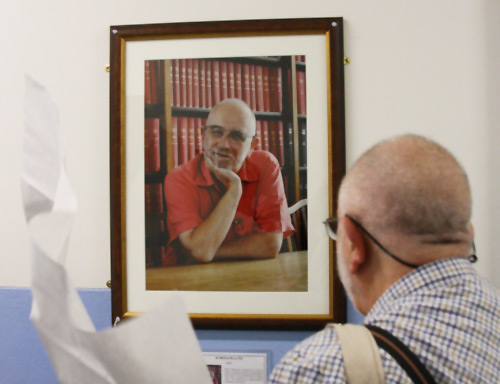Tag archives: Bristol
Eye-catching signs from March for Science Bristol
By James Dacey
On Saturday, there were almost 600 sister events across the globe in support of the March for Science gathering in Washington, DC. One such event occurred in Bristol, UK, where Physics World magazine is produced, which featured a march and speeches from science communicators. I popped along to the event with my camera and here are some of the most eye-catching signs from the day.
View all posts by this author | View this author's profile
Michael Berry at 75

A moment to reflect – Michael Berry unveils a framed photograph of himself in the University of Bristol at an event to mark his 75th birthday. (Courtesy: Brian R Pollard)
By Matin Durrani
Anyone who gets invited to an event that’s being held on April Fools’ Day is bound to think there’s something fishy going on. But last Friday’s meeting to celebrate the 75th birthday of Bristol University physicist Michael Berry was a genuine commemoration of his career, although it did have its lighter moments.
Grandly entitled “Physics, Art, Mathematics, Science”, the meeting was intended to reflect Berry’s extensive and wide-ranging interests, which stretch from the physics of waves and quantum phenomena to optics, tidal bores and magnetic levitation. (There’s also a phenomenon called the Berry phase, although I understand Berry himself is reluctant to use that term.)
It’s difficult to summarize Berry’s many contributions to physics – he has written approaching 500 papers – so I’m going to take the easy way out and instead point you at his excellent website, where you can easily get lost down lots of entertaining and stimulating rabbit holes.
If there’s one item on his site I can recommend, it’s his description of how his work on the mathematics of magnetic levitation led him to share the 2000 IgNobel Prize for Physics with the future (genuine) Nobel laureate Andre Geim, who in 1997 levitated a frog using a powerful permanent electromagnet while at Bristol.
View all posts by this author | View this author's profile
Getting into shape
By Tushna Commissariat
Just think how handy it would be if your mobile phone could transform into different shapes depending on what you are using it for – nice and compact if you want to, say, securely enter a password in a public space or a broad console when playing a video game. That vision has moved one step closer to reality thanks to a prototype ultra-flexible mobile device unveiled yesterday by a group of researchers from the Department of Computer Science at Bristol University in the UK.
